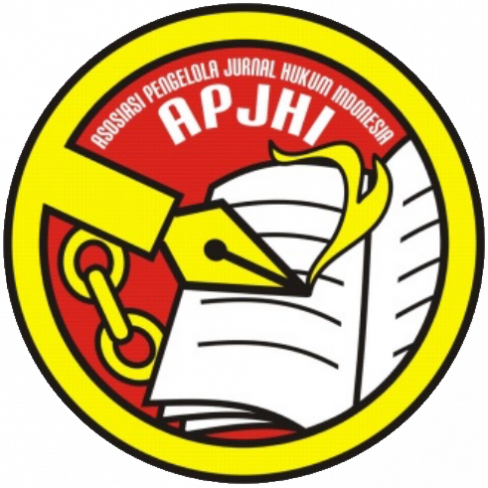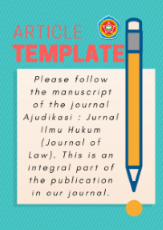Perbandingan Sistem Hukum Pidana Indonesia dengan Belanda Ditinjau Berdasarkan Karakteristik Romano-Germanic Legal Family
DOI:
https://doi.org/10.30656/ajudikasi.v6i2.5360Keywords:
System, Criminal Law, Comparative Law, Legal FamilyAbstract
In its development, the recognized legal families to date are the Romano-Germanic legal family, the common law family and the family of socialist law. Based on the three legal families, which legal family belongs to the Indonesian criminal law system. The purpose of this research is to find out which legal family belongs to the Indonesian criminal law system. The type of research used is normative juridical law research conducted using legal materials that focus on positive legal norms, consisting of secondary data as primary data and primary data as supporting data. The results of the studies that have been carried out show that the Indonesian criminal law system belongs to the Romano-Germanic legal family. This can be seen from the existence of identical characteristics, namely the use of statutory regulations as the main source of law in the form of a book and there is a codification system. Furthermore, based on a comparison with the Dutch criminal law system, several similarities were found, namely that the two countries base their criminal law on law.
Downloads
References
Buku:
Achmad, Ali. Menguak Teori Hukum (Legal Theory) Dan Teori Peradilan (Judicialprudence). Jakarta: Kenyan, 2012.
Amirudin, Pengantar Metode Penelitian Hukum, Jakarta: PT. RajaGrafindo Persada, 2004.
Atmasasmita, Romli. Perbandingan Hukum Pidana. Bandung: CV. Mandar Maju, 2000.
Burlian, Paisol. Sistem Hukum Di Indonesia. Palembang: Noerfikri Offset, 2015.
Cruz, Peter De. Perbandingan Sistem Hukum Common Law, Civil Law Dan Socialist Law. Bandung: Nusa Media, n.d.
McAllen, Gerald Paul. An Introduction to American Law. Carolina: Academic Press, 2010.
Merryman, John Henry. The Civil Law Tradition: And Introduction To The Legal System Of Western Europe And Latin America. Kedua. California: Standford University Press, 1985.
Qamar, Nurul. Perbandingan Sistem Hukum Dan Peradilan. Makasar: Pustaka Refleksi, 2010.
R. Achmad S. Soema di Pradja. Hukum Pidana Dalam Yurisprudensi. Bandung: CV. Arnico, 1990.
Jurnal:
Dyka Nurchaesar, Muhammad Rusli Arafat, “ERBANDINGAN SISTEM HUKUM PIDANA DI INDONESIA: PIDANA BARAT (KUHP) DAN PIDANA ADATâ€, Justitia: Jurnal Ilmu Hukum dan Humaniora 8, no. 4 (2021): 855
Ramadan, Choky R. “Konvergensi Civil Law Dan Common Law Di Indonesia Dalam Penemuan Dan Pembentukan Hukum.†Mimbar Hukum 30, no. 2 (June 2018): 214.
Widodo, Ernu. “Relevansi Sistem Civil Law Dan Common Law Dalam Pengaturan Hukum Perjanjian Baku Di Indonesia.†De Jure: Jurnal Syariah Dan Hukum 2 (December 2010): 122.
Downloads
Published
Issue
Section
License
Authors who publish with this journal agree to the following terms:
Authors retain copyright and grant the journal right of first publication with the work simultaneously licensed under a Creative Commons Attribution License that allows others to share the work with an acknowledgment of the work's authorship and initial publication in this journal.
Authors can enter into separate, additional contractual arrangements for the non-exclusive distribution of the journal's published version of the work (e.g., post it to an institutional repository or publish it in a book) with an acknowledgment of its initial publication in this journal.
Authors are permitted and encouraged to post their work online (e.g., in institutional repositories or on their website) before and during the submission process, as it can lead to productive exchanges and earlier and greater citation of published work.
All articles in Ajudikasi : Jurnal Ilmu Hukum can be disseminated provided they include the identity of the article and the source of the article (Ajudikasi : Jurnal Ilmu Hukum). The publisher is not responsible for the contents of the article. The content of the article is the sole responsibility of the author
Ajudikasi : Jurnal Ilmu Hukum is lincensed under a Creative Commons Attribution-ShareAlike 4.0 International License.










1.png)
.png)
.png)





.png)
.png)
.png)
.png)





.png)







